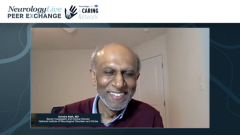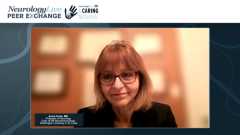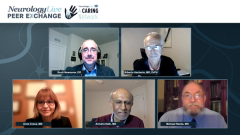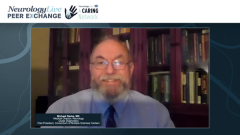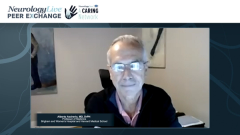
Translating New Advances to the Clinic
Alberto Ascherio, MD, DrPH; Anne Cross, MD; and Michael Racke, MD, discuss implications for patient communication and other advances from bench to bedside.
Episodes in this series

Scott Newsome, DO: Anne, I’m going to ask you this question, because this is going to come up. Once people become more aware of this study and other studies moving forward, we’re going to get tons of questions from patients. Just like with any new study that comes out, the patient is going to ask, “What can I do to get rid of this virus?” All of us are wondering whether that’s going to make a difference if you get rid of the virus. How are you going to answer these questions? It’s putting the cart before the horse, but what’s your approach going to be?
Anne Cross, MD: I’ll certainly mention that B-cell depletion—B cells are where the virus resides latently—seems to have a beneficial effect. Maybe it’s because we don’t get rid of all them, but when they come back, the disease comes back. It’s not as though you never have disease again. I’m going to tell them about some of the studies that people are talking about and beginning to do—early phase studies to try to get rid of EBV [Epstein-Barr virus]–affected B cells in particular with the early phase ATA188 study, which is utilizing T cells to go after B cells that are EBV infected. We don’t have any results. That was all started by Mike Pender many years ago when he started growing CD8 cells that were autologous to the patient and would attack EBV-containing B cells in that same patient. I don’t know that he has any great results on that yet. He probably hasn’t done enough patients. But studies like that might provide some insights, and also might give a little hope to patients who already have MS [multiple sclerosis]. If there ever was a sterilizing vaccine, that most likely wouldn’t help them once they got it.
Scott Newsome, DO: As far as my approach, I’ll tell you what I’m going to do. I’m going to get Alberto’s cell phone number. I have your cell phone number. I’ll say, “Talk to Alberto first so he can tell you how important EBV is,” and then you’ll do exactly what you just said, and then I’ll get off the hook. No—
Anne Cross, MD: Send that telephone number to me also, please.
Scott Newsome, DO: That’s right. In terms of next steps, there still needs to be a lot of work. It’s like with a lot of things in MS. We’re at the tip of the iceberg, and we have a lot of exciting data, but where do we go next? Alberto, where do we need to go with the work you’ve done and others are doing to take it from the stratosphere to the clinic? It’s challenging to try to translate it to the clinic.
Alberto Ascherio, MD, DrPH: Right. There are 2 areas of research in which we’re involved. One is treatment. I’m not a clinician, but they’ve been collaborating with clinical groups trying to promote trials of antiviral drugs effective against EBV in people with MS. It’s incredibly challenging. You probably know better than I do. For ethical reasons, given the very powerful treatments that are available, it’s not possible to do placebo-controlled trials. Basically, we’re suggesting trials of antivirals added on to standard treatment, but the standard treatment for relapsing-remitting MS is so effective against the relapses in the new lesions that it may be very difficult to demonstrate any benefit. It’s a bit unfortunate. We may have a hypothetical impact on strategy to treat MS, but it’s going to be very difficult to test it and to see if it works. It may work, but it may not work.
Specifically, there are some antivirals that in vitro seemed to have high activity against EBV. They’re considered very safe, like tenofovir alafenamide, which is a useful pre-exposure prophylaxis of HIV. We’ve been collaborating with the hypothesis of, can we test this in people with the MS? My role is as a collaborator, but we don’t do clinical studies. The other area is going in the other direction. Given that people get infected with EBV, can we predict who’s going to get MS? Can we find a biomarker, any signature? Going back to what Michael and Anne commented on before, can we identify the profile of antibody responses or other biomarkers that will identify who’s going to get MS? Because that could be very useful for secondary prevention. Maybe the disease process has started. We see it about to start, and we can do something to delay or prevent it. These are the 2 big areas.
Scott Newsome, DO: What you just said caught my attention with the NfL [neurofilament light chain] levels going up. Everyone is excited about NfL. There’s a lot of work that needs to be done there, especially in MS. You wonder if there will be a differential effect in those who are EBV positive. But I can almost envision a graph where NfL levels are going up in those who are destined to get MS, and it stays low in those who don’t.
Michael Racke, MD: Scott, when the NfL goes up, they have MS. That’s arguing that there’s damage happening in the nervous system. The CMSC [Consortium of Multiple Sclerosis Centers]—I’m trying to think if you participated in this—had a workshop at the last annual meeting looking at NfL as a biomarker. Not just for MS but also for Alzheimer disease and the neurodegenerative disorders, basically anywhere you’re killing neurons or damaging neurons, NfL gets into the blood.
The power of what Alberto has showed is that it could be a long time between when they first got exposed to EBV to when they clinically got MS, but you already see it early on. We always say that people probably get presymptomatic MS when there are lesions already happening. He’s using NfL as that marker to say, “Look, you get EBV.” Then you get those already showing that there’s some inflammation happening in the brain, and it can be a long time until the person has their first clinical exacerbation. But he’s already made the link that EBV led to the next step, which was damage in the nervous system that he’s measured with the NfL.
Scott Newsome, DO: You’re saying exactly what I said, so I’m agreeing with you, or you’re agreeing with me. What I was proposing is if the NfL level is normal and they’re EBV positive, then the chance of them having MS or developing MS could be considerably lower than someone who’s already having—
Michael Racke, MD: I hope that’s me.
Trnascript Edited for Clarity
Newsletter
Keep your finger on the pulse of neurology—subscribe to NeurologyLive for expert interviews, new data, and breakthrough treatment updates.

